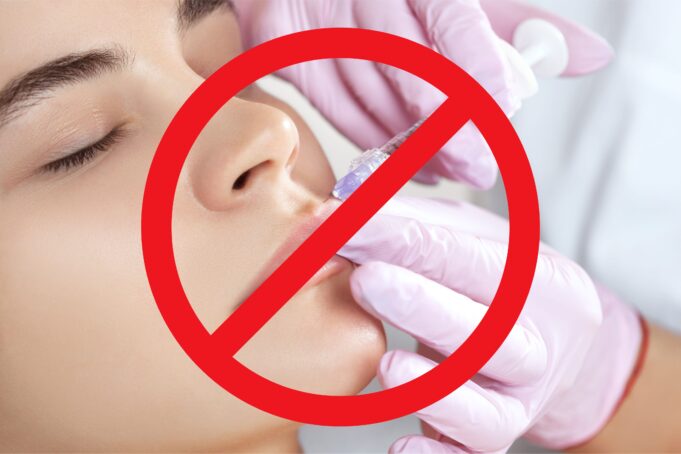From 1 June 2025, the practice of remotely prescribing injectable cosmetic products will be officially banned in the UK. This decision, announced by the Nursing and Midwifery Council (NMC), represents a significant step towards enhancing patient safety and addressing long-standing concerns within the cosmetic sector.
So, what does the ban actually mean?
Under the new rules, nursing and midwifery prescribers will no longer be allowed to issue prescriptions for injectable cosmetic treatments, such as botulinum toxin or dermal fillers, without conducting an in-person consultation with the patient. This includes both initial assessments and follow-up consultations, ensuring greater accountability and patient protection.
The NMC’s updated guidance aligns with similar regulations issued by the General Medical Council in 2012. Virtual consultations through methods like video calls, emails, or third-party communications will no longer be acceptable means for prescribing these non-surgical cosmetic products.
Why has it came about?
This decision stems from growing concerns over patient safety and the accessibility of cosmetic procedures. According to research conducted by the NMC, non-surgical cosmetic treatments were increasingly being carried out in unregulated environments, often by non-medical practitioners such as beauticians. Many patients were unaware that these procedures involved regulated medicines or that their prescribers often had no clinical interaction with them.
Reports of poorly administered treatments and “Botox parties” highlighted the risks of remote prescribing. These events, where injectables were administered informally and without proper oversight, put patients at significant risk of botched treatments.
Anne Trotter, NMC Assistant Director of Education and Standards, stated, “Face-to-face consultations will further improve [nurse prescribers’] ability to assess people holistically and ensure non-surgical cosmetic medicines are prescribed as safely and appropriately.”
How will it impact the industry?
The ban is expected to impact both practitioners and businesses in the aesthetics industry significantly. Nurses or midwives found engaging in remote prescribing after the implementation date will risk being removed from the NMC register, effectively barring them from practising.
Nurse Prescriber Stephanie Ness of Ness Aesthetics said: “I am thrilled to announce that the recent regulation banning remote prescribing is a significant step forward for our industry. At Ness Aesthetics, we have always prioritized face-to-face consultations before prescribing any treatments for our patients, ensuring they receive the highest standard of care.
“Unfortunately, remote prescribing has frequently continued, particularly in the realm of anti-aging and line-softening injectables. This practice often occurred without the necessary in-person consultation to conduct a thorough medical history and make informed prescribing decisions.
“It’s concerning that some nurses have prescribed on behalf of beauty therapists or non-prescribing practitioners, contrary to the guidance of Keough (2013), which advocated for a ban on remote prescribing in aesthetics.
“Therefore, we at Ness Aesthetics wholeheartedly welcome the NMC’s decisive action to reinforce the necessity of in-person consultations. This commitment not only enhances patient safety but also upholds the professional standards we value so deeply in our practice.”
Victoria Brownlie MBE, Chief Policy and Sustainability Officer at the British Beauty Council, praised the decision, describing it as a critical step towards improving public trust and safety in the aesthetics sector. Calling for broader regulatory standards, she emphasised the need for robust training, mandatory insurance, and regulated premises for cosmetic treatments.
David Sines, Chair of the Joint Council for Cosmetic Practitioners (JCCP), echoed this sentiment, stating that the ban on remote prescribing is “a central requirement to ensure patient safety and public protection.”
A New Era for Cosmetic Safety
This landmark change reflects a concerted effort by organisations like the NMC, JCCP, and British Beauty Council to bring greater regulation to what has been described as the “Wild West” of the cosmetic industry. The ban follows several measures introduced in recent years, including the 2021 prohibition of injectables for individuals under 18.
Though some business owners view the ban on virtual consultations as outdated, the move is widely supported by healthcare professionals. Dr Mike Tee of Harley Street Skin Clinic remarked, “Drugs such as Botox and dermal fillers are not without risk, and these are best communicated during a proper, face-to-face consultation.”
What’s Next?
Guidance on adapting operations is available through the NMC’s updated “Useful Information for Prescribers” resource. Businesses and healthcare professionals are encouraged to review these guidelines to ensure compliance with the new requirements.
As the updates take effect, this decision will serve as a pivotal moment for tightening safety standards in one of the UK’s most controversial yet high-demand industries. For patients, it signifies a step towards safer, more transparent cosmetic procedures.
Do you have a story? Email holly@harleystreetcommunications.co.uk













